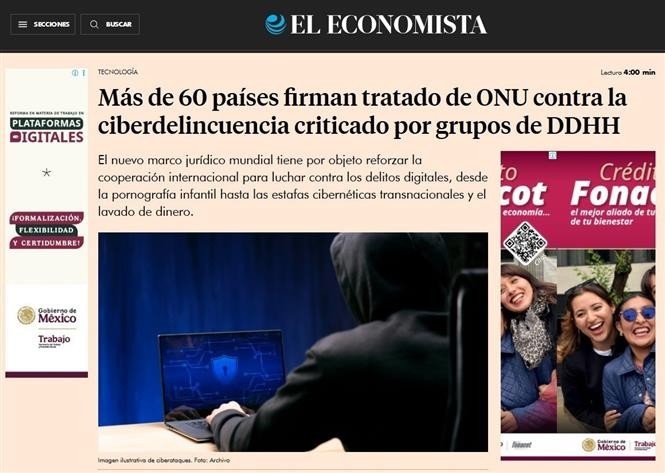They emphasized that the event reaffirmed Vietnam’s growing prestige, credibility, and capacity as a trusted partner on the world stage.
    |
 |
|
Mexico’s El Economista reports the signing of the Hanoi Convention. (Photo: screenshot) |
Venezuela’s multimedia outlet teleSUR published an article titled “U.N. calls for protection of people in cyberspace,” underscoring Vietnam’s active role in promoting multilateralism and fostering subsantive dialogue and cooperation among nations.
The outlet quoted U.N. Secretary-General António Guterres, who described Hanoi as “a fitting host for this moment,” reflecting the international community’s appreciation of Vietnam’s organization capacity and reputation in the international arena.
Meanwhile, the Spanish-language portal of the U.N. Office on Drugs and Crime (UNODC) noted that the signing ceremony of the Convention gathered representatives from dozens of countries and territories, including many Latin American nations such as Brazil, Chile, Costa Rica, Peru, Ecuador, Uruguay, and Venezuela.
According to UNODC, holding the event in Vietnam reflected the spirit of international solidarity and laid the groundwork for transnational cooperation in collecting digital evidence, protecting internet users, and preventing cybercrime.
Mexico’s El Economista highlighted that the signing of the Hanoi Convention by dozens of countries and organizations marks a crucial step toward establishing a unified legal framework to strengthen international cooperation against digital crimes, from online fraud and money laundering to child sexual exploitation on the internet.
The newspaper quoted experts as saying that selecting Hanoi as the venue sends a powerful message of trust and recognition of Vietnam’s rising role in global issues.
El Economista further said every day, sophisticated scams destroy families, deprive migrants of their savings, and cause billions of dollars in losses to the global economy. It, therefore, called for coordinated and powerful global response.
That spirit of collective action, the paper noted, was also the key message of the Hanoi high-level conference where Vietnam demonstrated its role as a bridge for cooperation and as a symbol of a pro-active, responsible, and reliable member of the international community in safeguarding global cybersecurity.
Latin American media also emphasized the convention’s potential positive impact on the region, which is facing growing cross-border cyber threats despite marked digital transformation efforts.
According to teleSUR, the participation of many Latin American countries in the Hanoi signing ceremony showed the region’s determination to strengthen its legal framework, enhance international cooperation, and build a safer and fairer cyberspace for all citizens.
On October 26, Argentina’s Infobae and La Nacion also reported the event, saying the convention, adopted in late 2024 after five years of negotiations, establishes common standards for investigating, prosecuting, and preventing online crimes. It covers a wide range of offences, from hacking and financial fraud to the non-consensual sharing of sensitive images, an issue increasingly concerning worldwide.
U.N. Secretary-General Guterres called the convention “a powerful, legally binding instrument to strengthen our collective defenses against cybercrime” and a demonstration of the vitality of multilateralism. “And it is a vow that no country, no matter their level of development, will be left defenseless against cybercrime,” he said.
He described the convention as “a victory for victims of online abuse” and "a clear pathway for investigators and prosecutors to finally overcome this barrier."
La Nacion further noted that the convention criminalizes a broad range of technology-related offenses and establishes a 24/7 cooperation mechanism among countries, allowing for rapid and efficient sharing of electronic evidence. It is also the first international treaty to classify the non-consensual distribution of intimate images as a crime and to address online sexual violence against children, a major step forward in protecting human rights in cyberspace.
The Hanoi ceremony also demonstrated the U.N. and the international community’s confidence in Vietnam, while affirming the country's active role in shaping a safe, transparent, and humane global digital order, and opening new opportunities for international cooperation in cybersecurity and sustainable development.
Source: VNA